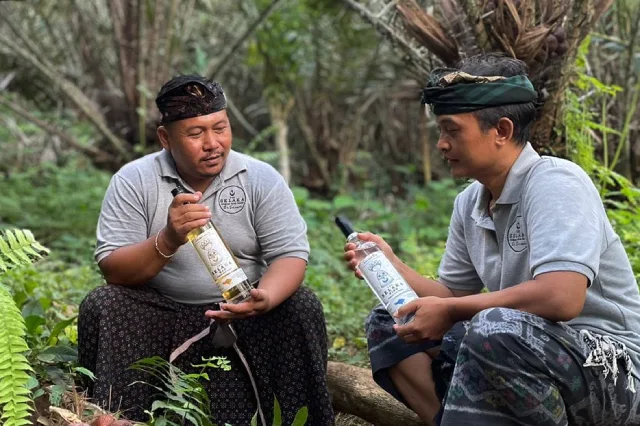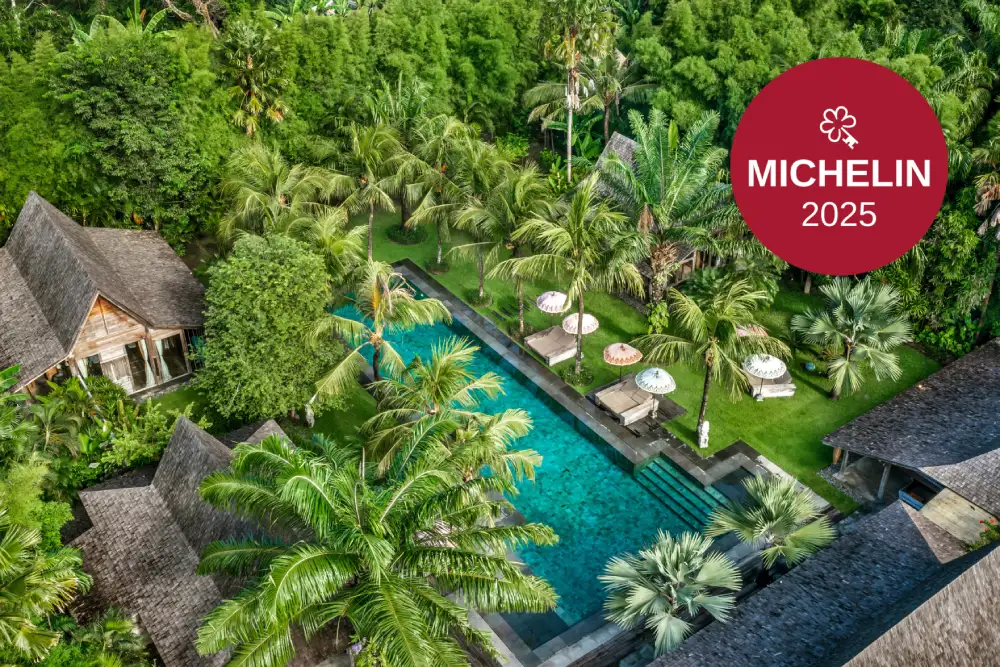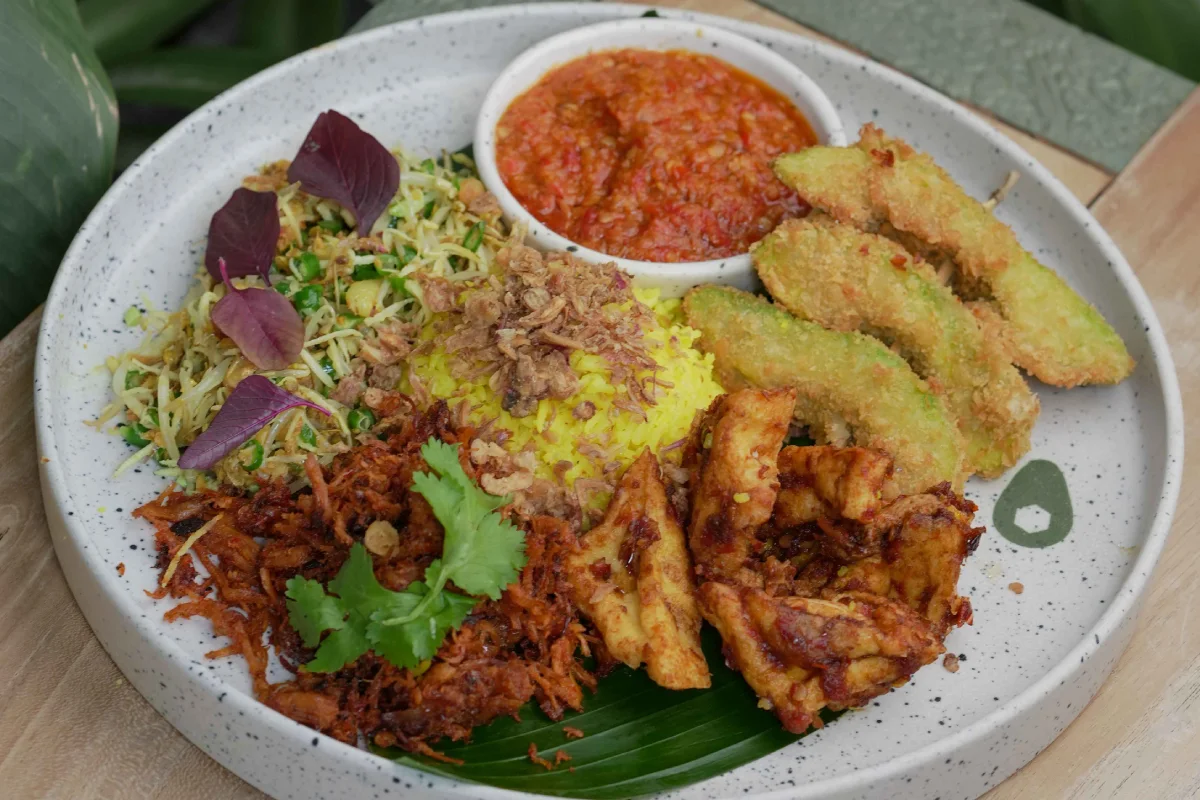Things to Do in Bali
The Global Landscape of Fast Fashion & Clothing Manufacturing Industry

Source: Freepik
18 July 2024
The clothing manufacturing industry, particularly its fast fashion segment, has become a cornerstone of the modern retail landscape. However, this rapid-fire production model, designed to quickly bring the latest trends from the runway to the consumer, has numerous adverse effects that ripple through environmental and social realms.
One of the most pressing issues is the environmental degradation caused by fast fashion. The industry’s focus on speed and cost-efficiency often leads to unsustainable practices.
From the excessive use of water in cotton farming to the release of toxic chemicals in textile production, the environmental footprint is substantial.
Synthetic fibres prevalent in fast fashion, especially polyester, shed microplastics with each wash, infiltrating our water systems and impacting marine life. It’s even been found in our bodies!
Additionally, the sheer volume of clothing produced results in significant waste.
The fast fashion model encourages a disposable culture, where garments are worn a few times before being discarded. This leads to overflowing landfills, where non-biodegradable materials can take centuries to decompose.
The concept of “out with the old, in with the new” perpetuates a cycle of overconsumption and waste, further straining our planet’s resources.
Social implications are equally concerning.
The fast fashion industry is notorious for exploiting cheap labour, often in developing countries where regulations are lax, and oversight is minimal. Workers in garment factories frequently endure poor working conditions, long hours, and meagre wages.
Child labour or forced labour are disturbingly common. These practices reflect a grim reality where the true cost of cheap clothing is borne by some of the world’s most vulnerable populations.
Moreover, the relentless demand for new collections places immense pressure on garment workers, leading to unsafe working environments. Tragic incidents, such as the Rana Plaza collapse in Bangladesh, highlight the devastating consequences of neglecting worker safety in favour of profit margins.
Despite global outcry and promises of reform, progress remains slow, and many workers continue to toil in hazardous conditions.
The Rising Call for Ethical & Fair Trade Clothing Manufacturing Practices
In recent years, the call for ethical manufacturing has gained momentum, reflecting a growing awareness and concern about the impacts of traditional manufacturing practices on the environment, workers, and society at large.
At the heart of the ethical manufacturing movement is the demand for transparency and accountability.
Today’s consumers are more informed and conscientious, seeking to understand the origins of the products they buy and the conditions under which they are made.
This transparency encompasses everything from the sourcing of raw materials to labour practices and environmental impacts.
Where traditional production processes often involve significant waste, pollution, and resource depletion. Ethical manufacturers are adopting sustainable practices, such as using renewable energy sources, reducing water consumption, and minimising waste.
They are also exploring innovative materials and technologies that have a lower environmental footprint.
For instance, the use of organic cotton, recycled fabrics, and biodegradable materials is becoming more common, reflecting a commitment to reducing the environmental impact of production.
Labour practices are another critical aspect of ethical manufacturing.
Where the dark underbelly of the global supply chain includes exploitative labour conditions, poverty wages, unsafe working environments, and child labour.
Ethical manufacturers are committed to Fair Trade business practices, ensuring that workers are paid living wages, work in safe conditions, receive personal development and growth opportunities, and are treated with dignity and respect.
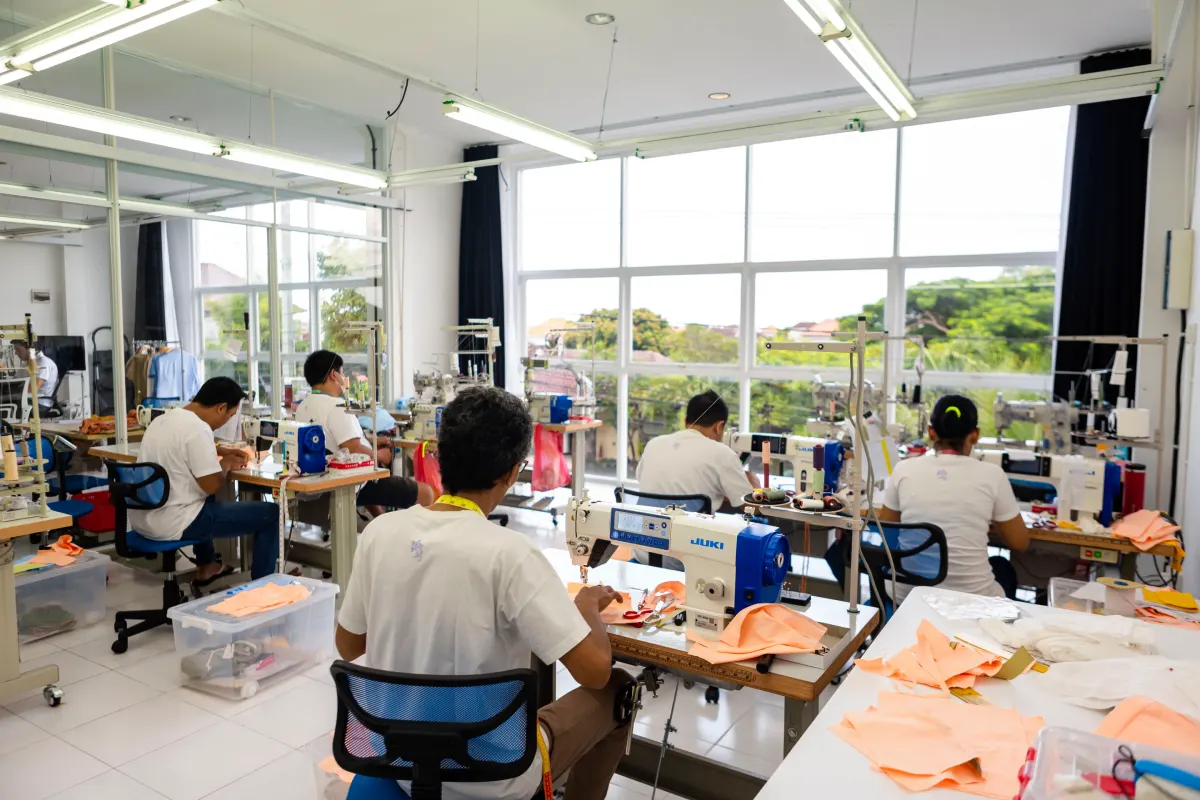
CM Garmindo Sampling Department
What’s in it for fashion brand owners?
Brands that embrace ethical and Fair Trade clothing manufacturing practices stand to benefit in numerous ways, from enhanced reputation and consumer trust to operational efficiencies and long-term viability.
By committing to ethical practices, brands contribute to a sustainable world and also position themselves for success in an increasingly conscientious marketplace.
CM Garmindo: Setting the Standard for Ethical & Fair Trade Clothing Manufacturing in Bali, Indonesia.
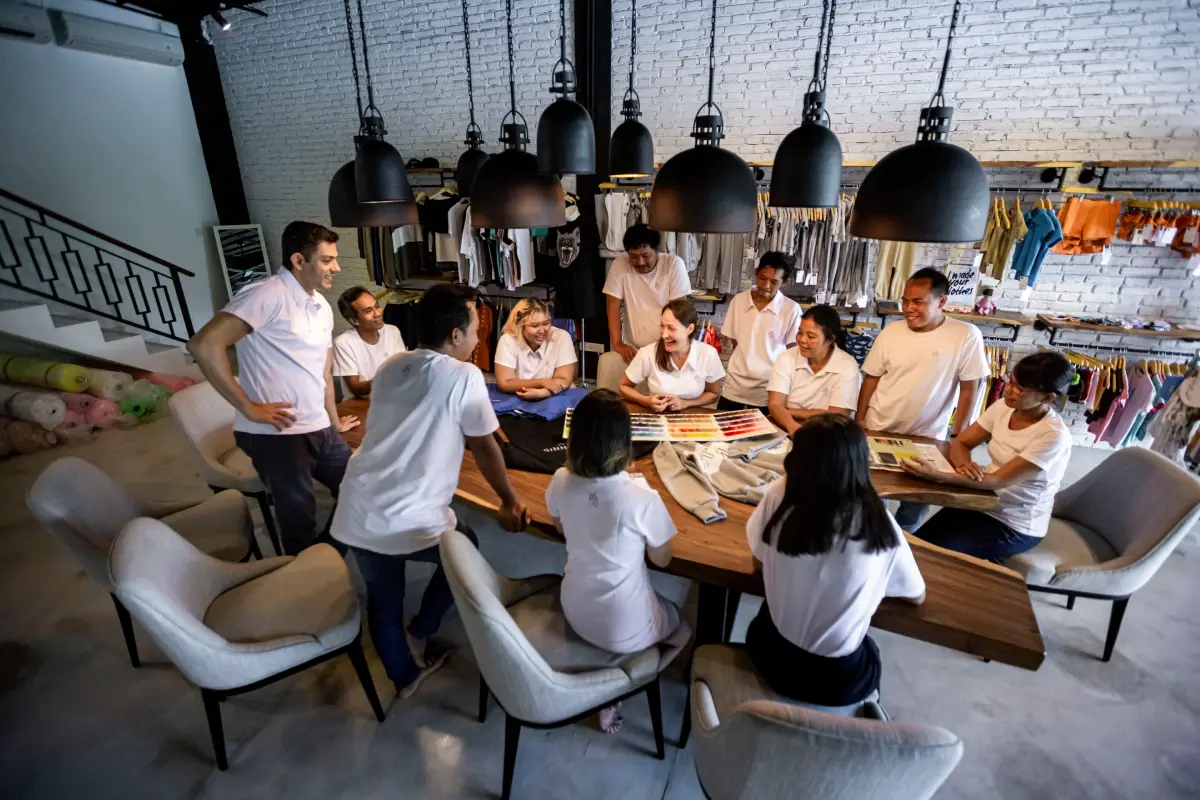
CM Garmindo Team Meeting
- CM Garmindo is committed to treating its employees with respect and dignity by paying fair wages and they receive compensation that exceeds local living wage standards.
- National health and pension benefits are automatically provided, securing the long-term well-being of employees.
- Employees enjoy 25 days of paid holidays annually, maternity leave, sick leave, bereavement leave, and more. This leave policy supports employee well-being.
- CM Garmindo provides healthy and nutritional meals at work. This initiative ensures that employees never worry about their food needs, promoting overall health and productivity.
- CM Garmindo is an equal opportunity employer, fostering a diverse and inclusive workplace.
- CM Garmindo partners with local upcycling facilities to transform textile waste into new, valuable products. This upcycling process reduces waste, promotes creativity, and supports a circular economy by reusing and recycling materials.
- Eco-friendly dyes and finishing processes are used to minimise water use and pollution, protecting local water resources.
- CM Garmindo prioritises the use of organic materials in its production processes, reducing environmental impact and promoting healthier ecosystems.
- CM Garmindo sources certified fabrics, such as those with Global Organic Textile Standard (GOTS), Global Recycled Standard (GRS), and OEKO-TEX certifications. These certifications ensure that the fabrics meet rigorous standards for environmental and social responsibility, including safe and sustainable production processes.
- CM Garmindo is compliant with REACH (EU), CPSIA (USA), CCPSA (Canada), and SASO certifications for clothing export. These certifications involve a comprehensive audit of factory operations to ensure compliance with stringent quality control standards. They guarantee that CMG’s products meet the safety and quality requirements of major global markets, enhancing the trust and reliability of CM Garmindo’s manufacturing practices.
- CM Garmindo’s quality assurance processes are approved by Intertek, a leading Total Quality Assurance provider. This certification ensures that customers receive products that meet consistent quality and safety standards, reinforcing CM Garmindo’s commitment to excellence.
Humans of CM Garmindo
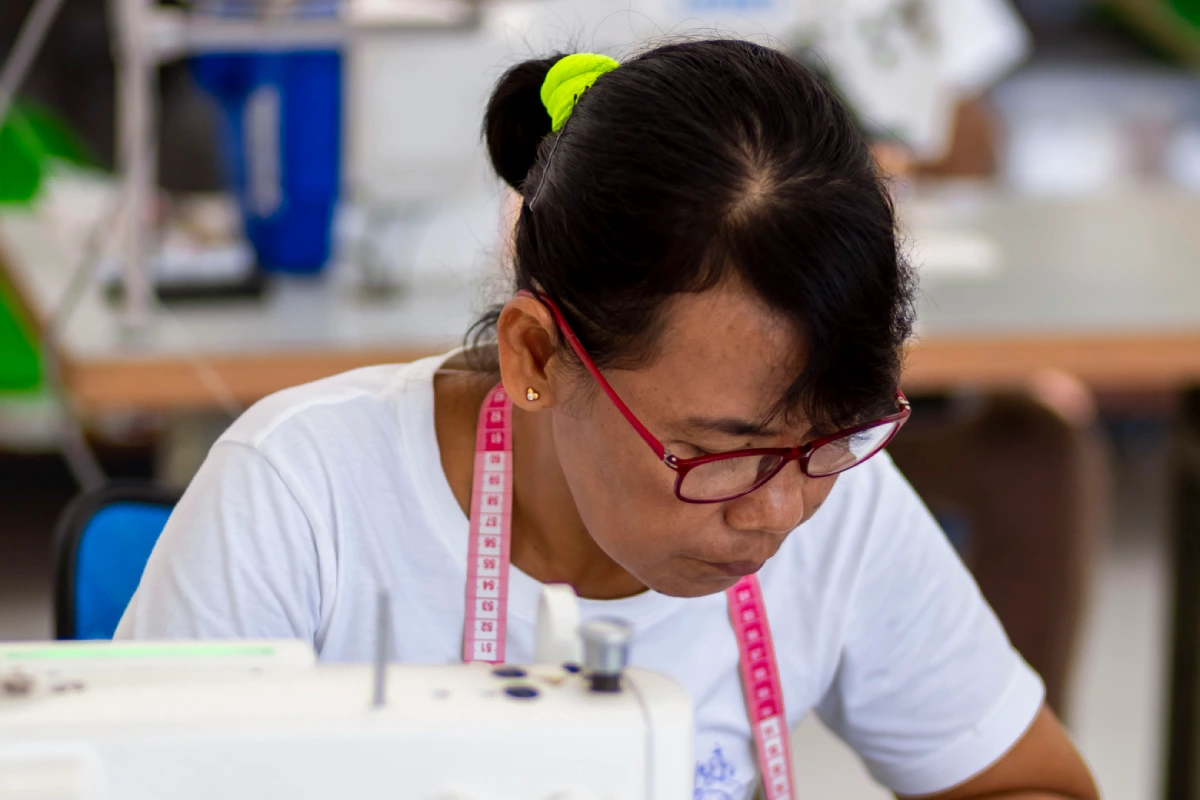
In Frame: Ibu Mus (Sewing Department, CM Garmindo)
Humans of CM Garmindo is a special segment on social media where CMG’s pride shines by showcasing the remarkable stories of the individuals who form the heartbeat of the company.
Enter Ibu Mus (sewer, CM Garmindo Sampling Department).
Ibu Mus’s previous employment as a sewer was marked by instability and exploitation.
She was often paid only $1 for each garment she produced, with payments sometimes arriving in instalments.
Frequently, she and other workers were forced to fight over scarce fabric resources, where Ibu Mus was not always paid.
As a single mother, she struggled to support her family. However, when Ibu Mus joined CM Garmindo, her life changed dramatically.
She received fair wages, job stability, and access to personal and professional development opportunities.
The personal story of Ibu Mus, and others like her, reveal the transformative impact of CM Garmindo’s Fair Trade policies on the lives of their employees; a message that is captured in the amazing Humans of CM Garmindo series.
At CM Garmindo, Fair Trade seems to be a love affair with the people of Indonesia.
They believe in transparency and equitability for every individual involved, from designers, to sample makers, quality control teams, to CMT productions sewers; to the communities they call home.
By ensuring fair wages, safe working conditions, and opportunities for growth, CMG has empowered their people to flourish; to thrive.
What’s Next for Fashion Brand Owners?
As the landscape of fashion continues to evolve, embracing ethical and sustainable practices is not just a trend; it’s a necessity.
Fashion brand owners have a crucial role to play in shaping the future of the industry. Here’s how brands can take action:
1. Exclusively work with ethical & Fair Trade clothing manufacturers;
2. Adopt sustainable practices at every activity-stage;
3. Prioritise transparency in the supply chain;
4. Educate their customers about the importance of conscious consumption.
It’s clear that brand owners should consider partnering with CM Garmindo because of the sheer quality of their products.
But it’s more than that.
CM Garmindo is clearly committed to setting an extremely high standard for ethical and Fair Trade practices in Bali, Indonesia.
Here’s what CM Garmindo believes we should all know about working with them:
1. Ethical Manufacturing Excellence: Experience our dedication to fair wages, safe working conditions, and transparent supply chains. Your brand can uphold high ethical standards while producing quality garments.
2. Sustainable Solutions: Integrate eco-friendly materials like organic and recycled fabrics into any types of garments such as activewear, resort wear, swimwear, kidswear or leisurewear. Utilise our upcycling initiatives to minimise waste. Benefit from our energy-efficient processes that prioritise environmental sustainability.
3. Transparent Partnerships: We believe in transparency – from design to sourcing to productions. Contact us to discuss how we can align with your brand’s values and provide clear insights into our manufacturing practices.
4. Seamless Production: Contact us today to explore how our expertise in ethical manufacturing and sustainable practices can elevate your brand’s product offerings.
“Every garment tells a story about who made it and how. Your story is one you should be proud of.” – Lianne Dennis, Production Director at CM Garmindo
Ready to start a brand? Access CM Garmindo’s catalogues at www.cmgarmindo.com or email them at start@cmgarmindo.com now!
All New Releases
Blue Karma Village Awarded One MICHELIN Key by The MICHELIN Guide
Tucked along a village road between Seminyak and Canggu, Blue Karma Village is a collection...
MoreOct

















